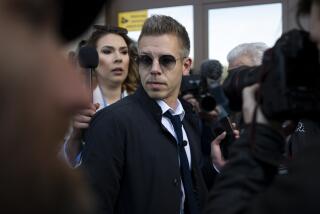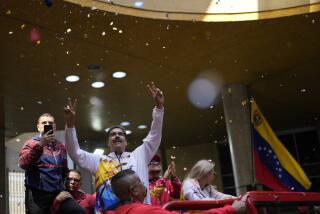Mugabe’s opponent is sworn in
An unsmiling President Robert Mugabe administered the oath of office for prime minister Wednesday to his bitter rival, Morgan Tsvangirai, in a power-sharing arrangement in which the president slightly loosens his three-decade monopoly on power.
Although the Zimbabwean president is sharing control of the government for the first time, he retains authority over the country’s all-powerful security forces.
Tsvangirai, who led Zimbabwe’s opposition to victory in parliamentary elections last year, called the deal “not a perfect agreement but still a workable one.”
But even the stiff body language at the ceremony hinted at the continuing enmity between both men.
Tsvangirai smiled briefly after taking the oath. Mugabe said “congratulations.”
Mugabe and Tsvangirai signed the power-sharing arrangement in September but got bogged down in wrangling over Cabinet posts, prompting questions about the willingness of Mugabe and hard-liners in the ruling ZANU-PF party to share power.
Tsvangirai’s Movement for Democratic Change, or MDC, gets control of the Finance Ministry and the difficult task of reversing the country’s economic implosion.
Skeptics question whether the pair can cooperate closely enough to address the hunger affecting 7 million of the country’s estimated 11 million people, an unemployment exceeding 90% and a cholera outbreak with 70,000 infected.
Many Zimbabweans fear that the government will fail. Gladys Maramba, 24, who sells goods on the streets of Harare, the capital, wanted to believe that Tsvangirai could deliver on the promise of change, yet said, “I doubt whether this thing will work. Let’s wait and see.”
She said she longed for stability, so she could look for a real job. “I don’t like being on the street every day.”
The opposition is expected to use its majority in parliament to ditch restrictive media laws. It also wants to reverse Mugabe’s recent five-year appointment of Gideon Gono, the Reserve Bank governor seen by many as responsible for the hyperinflation estimated to be in the trillions of percent.
Thousands of MDC supporters traveled in buses and open trucks or on foot to the stadium outside the capital, waiting hours for Tsvangirai to speak after he was sworn in.
One supporter, Better Dhliwayo, 30, a farmer from Chipinge in Manicaland province, said that if Mugabe would not cooperate, Tsvangirai should pull out of the government.
“Mugabe and his thugs will lose the next election by a wide margin. This government will work because a lot of people, a lot of countries . . . want it to work. If Mugabe remains stubborn and goes back to his old ways, then MDC must pull out,” Dhliwayo said.
Another supporter, Jeffrey Murehwa, 28, was optimistic. “Yes, there are ZANU-PF ministers, but it’s clear Mr. Tsvangirai will have an impact and carry the day,” he said.
Addressing the crowd, Tsvangirai said the first priorities were to revive democratic institutions and implement a new constitution, deal with hunger and cholera and get the economy working. He called for the release of 30 jailed political activists from the MDC and civil rights groups.
“It hurts that as we celebrate here today there are some who are in prison. I can assure you that they are not going to remain in those dungeons for any day or any week longer,” he said.
He said the government was “transitional” and not a “government of national unity.” That comment underscored one of the entrenched differences between the rivals: The opposition sees the deal as a short-term arrangement leading to new elections, but Mugabe’s ZANU-PF wants the government to remain in place for five years, in the hope that the MDC will fail to rescue the economy and lose popularity.
Tsvangirai named his party’s secretary-general, Tendai Biti, as finance minister this week, days after a judge threw out treason charges against Biti.
Tsvangirai promised that civil servants would be paid in foreign currency and called on all government employees to return to work so schools and hospitals could reopen.
African countries have called on Western nations to support the new government. But the United States and European countries have been lukewarm, unwilling to offer a rescue package for Zimbabwe without clear signs that all parties in the government are committed to economic and political reform.
The opposition won the first round of the presidential and parliamentary elections last year but lacked the outright majority needed to avoid a second round of the presidential vote.
Tsvangirai pulled out of the second round after Mugabe’s security forces and youth militias unleashed widespread violence, killing at least 180 people.
Mugabe pressed ahead in a one-man presidential vote condemned by African observers.
--
Mangudya is a special correspondent.
More to Read
Start your day right
Sign up for Essential California for news, features and recommendations from the L.A. Times and beyond in your inbox six days a week.
You may occasionally receive promotional content from the Los Angeles Times.






